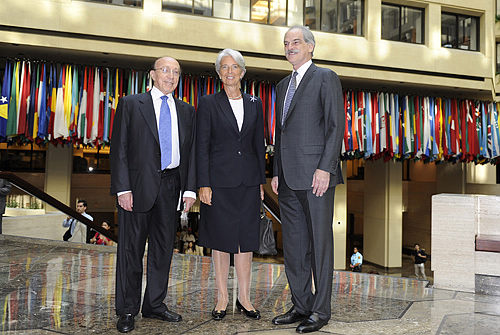|
 |
|
FIRST DAY: First Deputy Managing Director of the IMF John Lipsky (right) welcomes new IMF chief Christine Lagarde on her first day of work at the headquarters of the IMF in Washington, D.C., on July 5 (ZHANG JUN) |
On July 5, former French Finance Minister Christine Lagarde took the oath as the new managing director of the International Monetary Fund (IMF), becoming the first woman to take the organization's top job since its inception in 1944.
The world's most important international economic and financial organization finally ended a leadership crisis following the arrest of its former chief Dominique Strauss-Kahn on May 15 on rape charges.
Lagarde's selection as the IMF's new leader solves this problem. Now, Lagarde will face other problems as the IMF's future seems clouded.
Reputation
The IMF has carried a birthmark of political compromise since its establishment. It long maintained the Bretton Woods system of pegged exchange rates that was centered on the U.S. dollar. After the system collapsed in 1971, it continued to center on the U.S. dollar and supervised the exchange rates of countries through consultation as well as fiscal and monetary policy guidance. All these make people question its independence as an international organization.
What's more, if its independence issue has historical reasons, then the sequelae of Kahn's management is a realistic problem. Eliminating Kahn's style leftover in the organization is a severe challenge for Lagarde.
The IMF has been known for frequent failures to warn the world economy of impending doom. In June 2011, it was surrounded by another scandal involving presupposition of research results. According to a report of the IMF Independent Evaluation Office, IMF researchers often face the pressure of being forced to change their research results to support the IMF's existing opinions. When people link the early warning failures with the presupposition scandal, they cannot help suspecting the IMF's value orientation.
Although this speculation has not been verified, for a long time the bad feelings have produced a negative impact on the development of the organization. As a result, despite its fame as a world first-level organization, it could only play the role of a second-level one in international economic governance.
Another challenge is that the organization has never been successful in crisis governance. It should be one of the basic functions of the IMF to save countries in crisis. But in the past 60 years, few of its member states overcame any crises under its guidance. The reason lies in the intention of its aid. The organization regulates when a member state receives aid, it must accept attached conditions on economic system reform. These conditions embody a strong sense of the Washington consensus. They are mostly incompatible with the national conditions of the developing countries waiting to be rescued, and therefore it is difficult for them to be insisted on.
Now the IMF is faced with the European debt crisis, and the crisis in Greece is representative. After being nominated as the new chief, Lagarde still insisted on a tough stance against Greece. She requested Greece to realize an internal compromise in exchange for IMF aid. This is exactly the same as the organization's previous practice.
The problem is the aid for the EU this time bears much bigger risks than before. On the one hand, the possibility of a successful rescue for Greece is quite slim. So it is difficult for the IMF to save its reputation through this crisis. On the other hand, to save Greece means a high price will have to be paid. Given the poor financial situation of the IMF, Lagarde will soon find this rescue mission is actually a dilemma.
| 